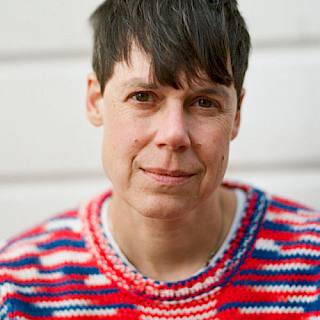Photo credit by Robin Christian ©.
In Defence of Reading as a Public Good by Isabel Waidner
In this inspiring piece, Fiction Judge for the 2024 Queen Mary Wasafiri New Writing Prize Isabel Waidner traces their own reading and writing career and explores the importance of libraries for working class writers in developing their craft.
Public libraries and inclusive Higher Education institutions have been of critical importance for my formation as a novelist. I am making an argument that never gets old, namely that a commitment to reading is a prerequisite for good writing, and that access to diverse, inventive forms of literature is the linchpin of the sort of ambitious and relevant literary culture we collectively might want to aim for. If I’m anything to go by, literature transforms lives.
I had just turned twenty when I arrived in the UK in the mid-nineties, alone. I had neither the financial means nor the necessary familial support to enrol on a university degree. Over the subsequent decade and a half, I worked in various minimum wage jobs, never not pursuing something a little more aspirational. I self-educated according to the inner workings of the fiction collection held in Swiss Cottage library, part of Camden Public Libraries, rather than, say, a designed curriculum. I imperfectly identified with disenfranchised modernists which further directed my reading: the collection had this particular rabbit hole covered. I remember taking out rarities including 1950s novels published by Polish immigrants Franciszka and Stefan Themerson’s Gaberbocchus Press, or Ralph Ellison’s Invisible Man, an eye-opening take on Black existentialism and absurdism. In Corey Fah Does Social Mobility, my most recent novel, the protagonist experiences a sort of flashback that gets at the feeling:
Oh no, me in the public library. Lots of mes, ages twenty-five til thirty-five, studying hundreds of books of literature and philosophy, self-educating like no one was watching, cos, matter of fact, no one was. Blunt pencil in hand, marking mind-blowing passages with delicate crosses. I was reading as if my life depended on it, and it did, it did.
And I was, and it did. My self-directed and inevitably imperfect studies enabled me – that is, gave me the skillset and confidence – to write novellas, stories and plays, and to enrol on several short courses on European Philosophy in the Adult Education Department at Birkbeck University of London. There were no formal entry requirements to these courses, and substantial discounts were offered to benefit claimants. Subsequently, I ‘upgraded’ to a British Library membership, and was eventually awarded funding to undertake a PhD as a non-traditional student in Creative Writing at Roehampton University, a post-1992 institution which historically has educated working-class and first-in-family students. Under the Conservative government, public libraries have suffered enormous funding cuts since 2010. Similarly, I believe the Adult Education Department at Birkbeck, in the shape it existed as then, was dismantled as part of a ‘cost-saving measure’, also in 2010. The Creative Writing department at Roehampton was closed in 2021, by a university management complicit in the ongoing, ideologically conservative ‘restructuring’ of the Higher Education sector in the UK. What does it mean when public libraries and HE institutions that have played a central role in transforming working-class lives in Britain are systematically undervalued and divested from, often under the guise of making savings, or ‘future-proofing’ an institution? Writers like me won’t be here, for starters.
Which brings me to my point, or one of the points I decided to make on occasion of the 2024 Queen Mary Wasafiri New Writing Prize: a commitment to reading, at every stage of a writing career, is indispensable. This last week an interviewer asked me, on the topic of my early formation as a writer, whether I had any mentors worth noting. To my regret, I didn’t. ‘I wish I did’, I said, ‘but I didn’t.’ ‘But you did’, the interviewer protested, harking back to the enthusiasm for libraries and reading I shared earlier in the conversation. ‘You were mentored by literature.’ They were right. I was. I still am.
Asked by Wasafiri magazine for a quote describing what I was looking for in submissions, I said I was looking for fiction ‘that is adventurous and inventive in its approach to literary form. That writes difference with urgency and criticality. That doesn’t underestimate humour as a strategy of resistance. And that knows, or knows it doesn’t know, what it wants.’ All of this stands. But I might add that I am looking for writing that is shaped by reading, and by life, and that understands that the two are, if not the same, then closely related.
Had I come to the UK as a young person thirty years later, in 2024, I might have tracked down readings via the internet. I might have still found Swiss Cottage Library — Camden Council responded to enormous funding cuts post-2010, and the recommendation to close nine of the thirteen libraries in the borough, with a series of measures including replacing library workers with community volunteers. Or, I might not have. I would have arrived in a national context where the value of reading has been systematically undermined. Where the arts and humanities have been falsely positioned as economically unviable, deterring specifically low-income demographics from entering the disciplines. (Actually, the creative industries deliver over £115bn in value to the UK.) As I write this, the education secretary announces further funding cuts to the creative arts at English Universities. Think about what it means if a Conservative government doesn’t want us to learn how to think critically, or how to imagine different futures. Time to push back.

